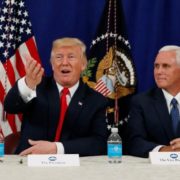Secretaries Mattis, Tillerson clarify comments, emphasize importance of diplomacy
As a way to make a point to the Democratic People’s Republic Of Korea (DPRK), President Donald Trump on Tuesday, August 8 warned North Korea that if the country continues provoking the United States, it will not get away with it.
During a photo op at his Trump National Golf Club in Bedminster, New Jersey, the president escalated the long-standing hostility between the two nations when he declared, “North Korea best not make any more threats to the United States.”
He added: “They will be met with fire and fury like the world has never seen… he has been very threatening beyond a normal state. They will be met with fire, fury and frankly power the likes of which this world has never seen before.”
Trump’s jarring statements are likely a response to recent findings from U.S. intelligence that concluded that North Korea has produced a nuclear warhead that can fit on long-range missiles. Not long after Trump’s comments, Pyongyang warned the international community that it will strike “an enveloping fire” around Guam, where the U.S. holds a crucial Air Force base.
Previously, North Korean Foreign Minister Ri Yong-ho said at the Association of Southeast Asian Nations (ASEAN) Regional Forum in Manila that North Korea has no intention to attack other countries “except the U.S.”, as the Asian Journal previously reported.
Earlier this week, the United Nations Security Council unanimously passed a resolution that imposed strict new sanctions, which will cut North Korea’s annual export revenue of $3 billion by more than a third.
Just a day after Trump’s comments, Secretary of State Rex Tillerson clarified the president’s statements, arguing that North Korean Leader Kim Jong-un’s hostile language prompted Trump’s words.
“North Korea’s rhetoric has just ratcheted up louder and louder and more threatening. So I think the President – what the President is doing is sending a strong message to North Korea in language that Kim Jong-un can understand because he doesn’t seem to understand diplomatic language,” Tillerson told reporters.
Tillerson, who has emphasized the importance of diplomacy when dealing with North Korea, added, “I think the President just wanted to be clear to the North Korean regime on the U.S.’s unquestionable ability to defend itself, will defend itself and its allies, and I think it was important that he deliver the message to avoid miscalculation on their part.”
Mirroring Tillerson’s sentiments, Defense Secretary Gen. James Mattis also issued an ultimatum to North Korea to “cease any consideration of actions that would lead to the end of its regime and destruction of its people.”
In the past, Mattis has routinely said that he prefers to resolve tensions with North Korea through diplomacy, emphasizing that military action could lead to disastrous consequences.
“Kim Jong Un should take heed of the United Nations Security Council’s unified voice, and statements from governments the world over, who agree the DPRK poses a threat to global security and stability,” Mattis said in a statement.
Washington lawmakers outside of Trump’s cabinet blasted the president for his comments which may incite further nuclear action from North Korea.
Sen. Jack Reed (D-R.I.), a top ranking Democrat on the Senate Armed Services Committee, denounced the president’s aggressive comments, saying that, more than ever, the Trump administration must demonstrate “steady leadership” in crisis situations.
“The president’s ‘fire and fury’ ad-lib was not helpful. Defusing the North Korean threat will take smart, steady leadership and stronger diplomatic ties with our key allies,” Reed said in a statement, adding that the U.S. can utilize diplomatic, financial or other means of negotiating rather than just resorting to military options.
For years, North Korea has been constructing and testing missiles, putting the international community on edge. Last month, it tested an intercontinental ballistic missile (ICBM) that is reportedly capable of reaching the U.S. mainland, U.S., experts said.
Officials also said that it is believed that North Korea also already possesses medium-range missiles that could deliver a nuclear warhead to South Korea and Japan. (Klarize Medenilla/AJPress)






